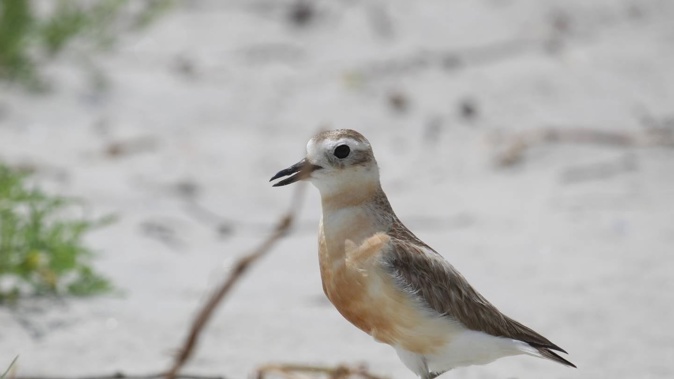
Former Prime Minister Helen Clark has spoken out after vandals targeted one of the country’s largest nesting colonies of endangered dotterels at Waihī Beach.
Police have been called after the vandalism of the nesting site, which resulted in a number of birds going missing, was discoveredon Christmas Day.
One of the birds included a newly hatched chick named after local conservationist and lifelong bird enthusiast, 101-year-old George Clark - the father of Helen Clark.
Over the past four years, a group of Waihī Beach residents have been taking care of the endangered native Northern NZ Dotterels - the birds are deemed “more at risk” of extinction than the Brown Kiwi.
Dot Watch, of which the former prime minister is a member, protect the dotterel and its habitat at Waihī Beach.
In the written statement, Dot Watch said this year had seen the largest nesting colony of the dotterels in New Zealand situated at the north end of Brighton Reserve, with an “unprecedented” number nesting in one small area on the southern slope of Brighton Reserve.
“A double cordon has been erected, with signage asking residents and visitors to keep dogs on leads, to tread carefully and to respect this endangered species,” the statement said.
“Residents have even taken great lengths to relocate their cats over the five weeks of summer [critical nesting period] in the vicinity or keep them inside at night.”
Due to the “seriousness of this type of vandalism and the fact that nests had been destroyed, and a newly hatched chick called ‘George’ could not be located, the police had to been called.
“Volunteers put in hundreds of hours every year to help protect the species, to have someone come and destroy all that hard mahi in a short time, is just mindless disrespect”, the statement said.
Disturbing protected birds and destroying nests is an offence under the Wildlife Act 1953, which can result in a prison term and/or a fine of up to $100,000.
The vandalism was discovered by volunteer Chris Sloan as she went to conduct her usual nest monitoring.
“There was no sign of the newly hatched chick ‘George’ and some of the birds were missing. I didn’t have my phone, so had to try and put back the cordon by myself – something at least three volunteers would have done,” Sloan said.
In the statement, George Clark said he was “extremely upset” by the news.
“ Our native species are fighting a tough battle against many predators, and only the dedicated efforts of local people who care, give our endangered NZ dotterel any chance of surviving.
“This is an atrocious act of total disregard towards our precious species, and it saddens me beyond belief. I am 102 in March, and I have never heard of anything like this happening at Waihī Beach before,” he said.
In the statement, Helen Clark said threats posed to the dotterels had been “overwhelming” and not only from introduced mammal predators.
“It has been a constant battle to protect the birds, with the added challenges of some people using the nest cordons as football goals, and dotterel eggs being destroyed by golfers and golf balls and now this.
“Dot Watch is determined to see that these endangered birds have a chance to survive, and everyone has a role to play in ensuring that and stop this behaviour.”
Clark said Dot Watch was " very thankful’ to the Waihī Beach community and visitors who rallied to help protect these birds and hoped this incident of vandalism “would not happen again”.
/cloudfront-ap-southeast-2.images.arcpublishing.com/nzme/O6FYDWQLUVHZ7IO55FX3T4YVDM.jpg) Dot Watch team members Helen Clark and her 101-year-old father George on dotterel watch patrol at Brighton Reserve in Waihi Beach. Photo / Dot Watch
Dot Watch team members Helen Clark and her 101-year-old father George on dotterel watch patrol at Brighton Reserve in Waihi Beach. Photo / Dot Watch
Waihī Beach swells from 4000 to 25,000 for the five weeks of summer at the most critical time during the Dotterels breeding season, the statement said.
In collaboration with the Dot Watch team, the Western Bay of Plenty District Council and the Department of Conservation have carefully considered how these endangered birds would successfully fledge chicks when an overwhelming number of visitors hit the beach over the summer.
Police have been approached for comment.
Helen Clark’s advice for visitors and residents:
· Be mindful of signage about protecting dotterels, and leash dogs at least 50m from nest sites
· Keep companion cats in at night within 2km of a nesting area.
· Keep your distance (50m) from these birds and nest sites
. If dotterels are incubating eggs and leave the nest, their eggs can get too hot or too cold
. Chicks could get into difficulty without protection from parent birds.
· Tell your friends and whānau how they can help protect these endangered birds.
Take your Radio, Podcasts and Music with you









